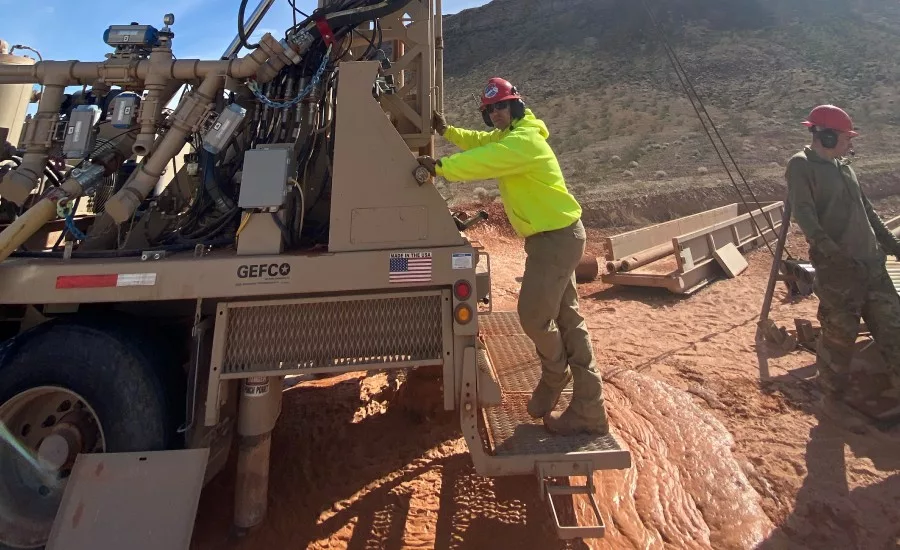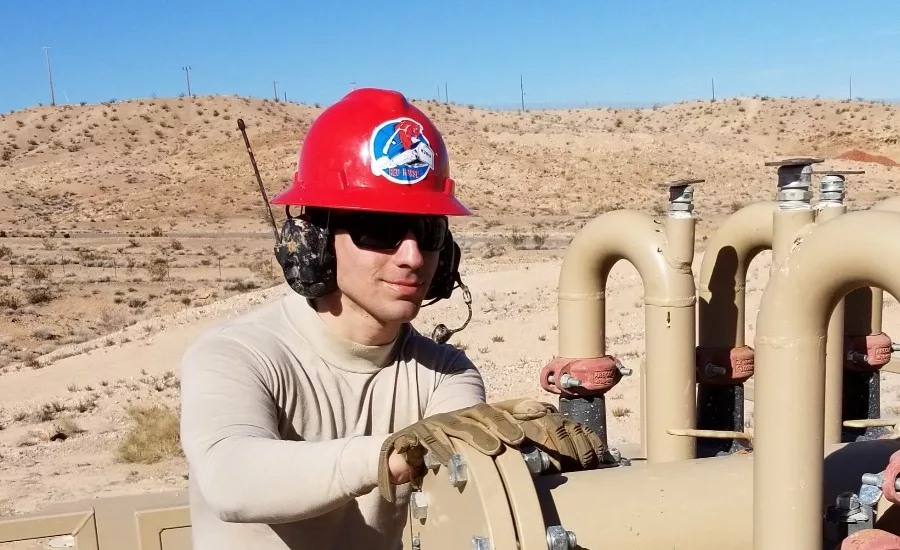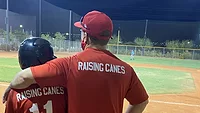How to Spot 'Blind' Leaders On and Off the Drilling Jobsite
Leaders Not Open to Lessons, Input can put Safety at Risk

Jake Fletcher cut his leadership teeth in the U.S. Air Force’s RED HORSE well drilling training program.
Source: Jake Fletcher photos

For those of you who do not know me, my name is Jake Fletcher, and I am a captain in the United States Air Force Reserves in Las Vegas. I spent five years on active duty before making the transition to the Reserves so that I could ultimately pursue a career in the drilling industry, which is my passion. Before I begin, let me make clear that my views and opinions are solely my own and do not reflect the views of the U.S. Air Force as a whole.
Now that we have the formalities out of the way, I can speak freely. I could take some page space to explain how fellow National Driller writer Brock Yordy became one of my best friends and how he introduced me to plenty of other great people in the drilling community, but I would rather get to my topic this week and save the fun stories for future videos and other pieces. When Brock asked if I wanted to contribute to National Driller, I naturally said yes — and that I would love to write about leadership. I thought a good starting point would be to discuss the dangers of leaders who strive to appear that they know more than they really do, or “blind” leaders as a like to call them. I am sure there are much more colorful terms out there to describe these types.
There is a famous quote in the movie “Annapolis.” (I am a huge movie fan, by the way). Tyrese Gibson, who plays the part of Midshipman Cole, introduces himself to the freshmen in his unit. He directs one of the cadets to get into a body bag on the ground. He then tells another cadet to close the bag and directs them all to look at it, saying, “I want you all to remember what that bag looks like with a body in it, because if you become officers this is where they’re going to put your mistakes.” Most career fields probably do not need to consider things to this extreme, but it paints a good picture of the dangers of blind leadership.
You are probably wondering, “Well, Jake, how do I recognize a blind leader? What do they look like?” The truth is many people cannot recognize them. Most people do not have enough subject matter expertise to decipher when a person makes things up as they go along. This key trait defines a blind leader and inspires a phrase I despise: “Fake it ’til you make it.” Observers can better recognize blind leaders by building their knowledge of whatever field they work in. If you are new to the field, pay attention to the people around you. Watch the body language of people when the person in charge addresses the team. Are they closed off? Do they pay attention? This can indicate whether the leader has credibility with the team. Talk to people who served the company for a long time. Ask them why they chose to stay, and about their perspective of the leadership on the team.
Why care about the presence of blind leaders? In the field, they can compromise the safety of an entire team in multiple ways. If you have not seen “Band of Brothers,” you probably should quit reading this and come back after you have watched it. One of the characters, Capt. Herbert Sobel, offers a perfect case study in the dangers of blind leadership. Sobel, based on a real commanding officer of Easy Company, 101st Airborne Division, has nothing but pride in his position. He enjoys reminding troops of his leadership, and that he does not require input from anyone else. In his mind, he knows what he is doing and what is best for the unit.
Two famous scenes solidify him as a blind leader and, ultimately, seal his fate. Easy Company, preparing to enter World War II, participates in a combat exercise navigating across land to accomplish multiple objectives. Sobel, who clearly cannot read the map and is lost, directs the troops to leave a concealed position and wait to ambush an enemy unit. Seconds after Sobel orders the company to leave their foxholes, another unit hidden nearby ambushes them, eliminating them from the exercise.
Non-commissioned officers (NCOs) in the unit go to Regimental Commander Col. Robert Sink with a signed petition stating they could no longer faithfully serve as leaders in a unit with a commanding officer who was going to get them killed. The colonel responded by punishing several of the men with a reduction in rank and sending the others back to Easy Company. (The reasoning for this is another leadership lesson for another day, concerning insubordination.) The colonel, however, did listen to what the men had to say. Ultimately, Sobel was gracefully removed from command. Superiors framed it as a “promotion”: He had trained the best company in the regiment and, as a reward, was sent back to Airborne school to lead training for incoming soldiers.
Sobel’s story highlights several dangers of blind leaders in the field. A blind leader lacks decisiveness in critical moments. The nerves of leadership, and of not knowing what to do, combine with pressures from the team to decide. This creates the conditions for dangerous decisions, made rapidly. Long periods of indecisiveness and a lack of vision, mission and goals cause frustration with and doubt in leaders. In Sobel’s case, refusal to take feedback or input from the team in the decision-making process also exacerbated the pressures he felt. Instead of being transparent with the troops, Sobel felt the need to shoulder everything himself for fear he would appear weak or lose credibility if he did not have all the answers. As such, he ordered the men to leave a position of cover because he succumbed to the pressures previously mentioned and cost the lives of his men in the exercise. This led to the loss of credibility, which cost him the command of Easy Company.
You probably wonder how this story of soldiers from the Greatest Generation pertains to anything today. The truth is blind leaders can be found in any organization, any team, any field of work. In our field, a leader afraid to admit they do not have all the answers and who makes a quick decision under pressure can prove as disastrous as a bad commander giving orders to troops on the battlefield. Imagine a lead driller who makes decisions without any idea of the implications. We could be lucky, and nothing happens, or we could turn around and find someone crushed under a piece of steel or with a hand caught in the rig.
When should we, like the NCOs in the TV series, voice our concerns about a blind leader? Ultimately, when such a leader’s actions directly affect safety. When we look around and the morale of the team has clearly deteriorated, we should say something. Remember, good leaders take time to develop. Remember also that using subject matter expertise to call out a blind leader in public may backfire. Instead, turn to an old remedy most people forget about: feedback.
Most people naturally recognize when a problem exists. But they may not know the solution if we miss the key step of having the courage to offer feedback. If the feedback is not received, then perhaps the answer is to remove that leader, as in our story here. A leader, however, belongs to the team and the first reaction should never be, “How can we get rid of him?” Instead, we should continually educate ourselves in our subject matter, strive to act as good teammates, and offer feedback to leaders when we have concerns about their direction.
Sobel refused to hear feedback from his troops and, ultimately, his replacement Major Winters led them through WWII — where they fought and won with honor. But what if Sobel had listened to them? He missed the chance to go into combat with one of the greatest military units that ever walked the earth. What about the Captain Sobel on your team? Will you have the courage to offer feedback? Will you be a subject matter expert who cuts down leadership because they do not have all the answers, but are trying to lead? Will you be a good teammate who offers feedback and tries to help someone else grow — even if that person comes from a younger, different generation than you? Or will you let them miss out on the chance to go forth and accomplish great things for people around the world in our amazing industry?
Training, Professional Development for Drillers amid Covid-19
Capt. Jake Fletcher appeared on episode 4 of Drilling In-Site, speaking with us about training and professional development during the pandemic. See that episode at www.thedriller.com/articles/91872-training-professional-development-for-drillers-amid-covid-19.
Looking for a reprint of this article?
From high-res PDFs to custom plaques, order your copy today!





